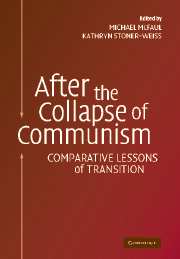Book contents
- Frontmatter
- Contents
- Contributors
- Introduction: The Evolving Social Science of Postcommunism
- 1 The Triumph of Nation-States: Lessons from the Collapse of the Soviet Union, Yugoslavia, and Czechoslovakia
- 2 The Fourth Wave of Democracy and Dictatorship: Noncooperative Transitions in the Postcommunist World
- 3 Circumstances versus Policy Choices: Why Has the Economic Performance of the Soviet Successor States Been So Poor?
- 4 Whither the Central State? The Regional Sources of Russia's Stalled Reforms
- 5 Parties, Citizens, and the Prospects for Democratic Consolidation in Russia
- 6 Comparative Democratization: Lessons from Russia and the Postcommunist World
- 7 Russians as Joiners: Realist and Liberal Conceptions of Postcommunist Europe
- Index
Introduction: The Evolving Social Science of Postcommunism
Published online by Cambridge University Press: 07 September 2011
- Frontmatter
- Contents
- Contributors
- Introduction: The Evolving Social Science of Postcommunism
- 1 The Triumph of Nation-States: Lessons from the Collapse of the Soviet Union, Yugoslavia, and Czechoslovakia
- 2 The Fourth Wave of Democracy and Dictatorship: Noncooperative Transitions in the Postcommunist World
- 3 Circumstances versus Policy Choices: Why Has the Economic Performance of the Soviet Successor States Been So Poor?
- 4 Whither the Central State? The Regional Sources of Russia's Stalled Reforms
- 5 Parties, Citizens, and the Prospects for Democratic Consolidation in Russia
- 6 Comparative Democratization: Lessons from Russia and the Postcommunist World
- 7 Russians as Joiners: Realist and Liberal Conceptions of Postcommunist Europe
- Index
Summary
This volume is the product of a conference, entitled Ten Years since the Collapse of the Soviet Union: Comparative Lessons and Perspectives, held at Princeton University in the autumn of 2000. The genesis of the conference lay in our shared belief that the study of the formerly communist world had much to offer comparative politics, but that few if any volumes actually had yet attempted to explore what these contributions might be. We wanted to move away from the often shrill debate between area specialists and general comparativists toward a more constructive blending of comparative political science and the best of area specialization. As a result, we gathered together a distinguished group of scholars pursuing research in Eastern Europe and the former Soviet Union with in a distinctly comparative framework.
In producing this volume, we set out to answer three questions: First, more than ten years after the collapse of the Soviet Union and the initiation of sweeping economic, social, and political change in the post-Soviet states, what have we learned? Second, how are we to understand theoretically the complicated and multidimensional components of triple transitions? Finally, what new theoretical insights into democratization, political economy, and state formation does the post-Soviet transition experience offer the study of comparative politics and international relations more generally?
We began our project with the assumption that “change” was the generic dependent variable in need of explanation. The collapse of the Soviet Union and the emergence of new polities and economies in the former Soviet space constitute a rare turning point in world history.
- Type
- Chapter
- Information
- After the Collapse of CommunismComparative Lessons of Transition, pp. 1 - 20Publisher: Cambridge University PressPrint publication year: 2004
- 1
- Cited by



